WRITTEN BY MAX MCGUIRE ’24
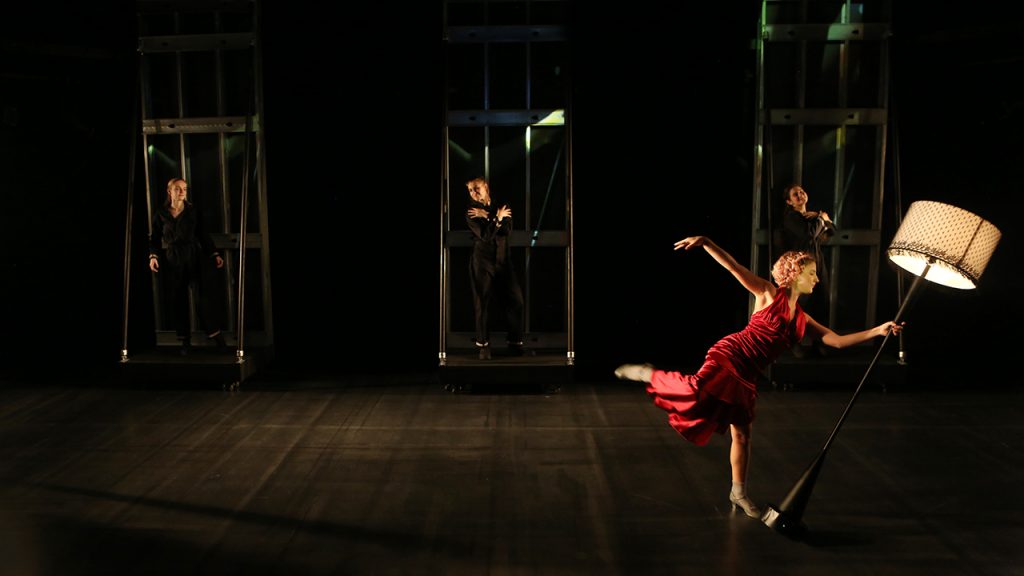
“There is no such thing as an original play”
This is the first statement playwright Charles Mee says on the [RE]MAKING project website. He goes on to discuss how even what we consider “the classics”- Shakespeare, the Greek comedies and tragedies, even works we create about our own life experiences- have all been taken from something we are already familiar with. Poems, creation myths, fairy tales, other stories- even the familiarity of understanding each other. As the character Prior Walter says in Tony Kushner’s Angels in America- “It’s something you learn after your second theme party: It’s all been done before”.
Thus, the [RE]MAKING project was born!
Charles Mee has put all seventy-one of his plays online for performing artists to use for free. Director Jared Klein had a vision- to assemble a team that would collectively dissect Mee’s play “The Thursday After the Pandemic”. Mee categorizes this play as “wild and crazy”, and with his permission, Klein and the Black Box team spent six weeks cutting and pasting the show until it became an entirely new production within itself. The play [RE]MAKING is an artistic hodge-podge of sixteen parts, all discussing desocialization and resocialization.
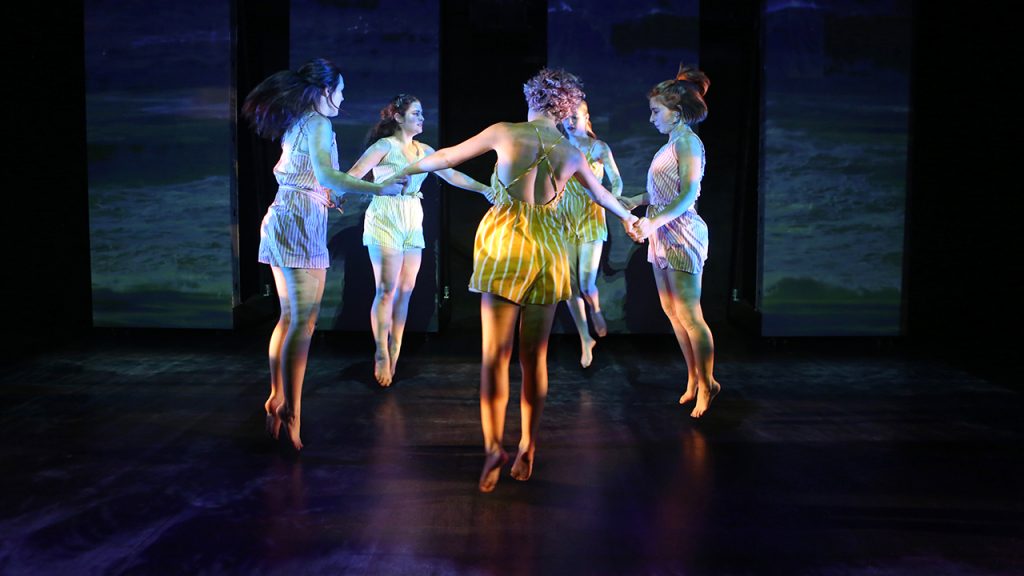
The play begins with a series of overlapping “hellos” as if to greet the audience- to say “welcome to the next ninety minutes of ‘wild and crazy’”. Each of the cast members, called “The Bodies”, wears matching black jumpsuits to signify uniformity. From there, the play jumps right into its inherent absurdism. Various material items are brought on and offstage, surrounding actor Josh Lucey (‘25) until he is completely drowning in “things”. Materialism is a recurring motif in [RE]MAKING– we see this later in Part #5, where The Bodies hold a fashion show in a garage, wearing excessive amounts of clothing. Other motifs in the show include painting and dancing- later on in the show, Asher Cortés (‘27) depicts a dancer while Lucey depicts a painter. Lucey monologues about how his entire day is spent moving across his studio, working from one side of the room to the other. Lucrezia Zichichi (‘24) later parallels this monologue, saying how if they had artistic talent, they would spend their entire day painting. At one point, Olivia Berenson (‘24) depicts Picasso who, despite being told their art is awful, continues to paint.
Meanwhile, the idea that music and dance are universal consistently appears throughout the play, with various songs interjected throughout the performance. Towards the beginning of the play, The Bodies dance on what seemingly is a beach, until they become fearfully aware of the audience and the music becomes distorted and robotic. At one point, Zichichi wears a red dress and performs a tango with a lamp. Isadora Zucker (‘25) leads a chorus of Bodies on guitar during Part #13, titled “Folklore”. However, what stood out to me the most was Sylvie Robinson’s (‘27) performance of “August” by Madeline the Person and Adam Melchor. Robinson’s voice lit up the room as she depicted a jazz lounge singer, taking the high part of the song over a mystery singer on the alto line.
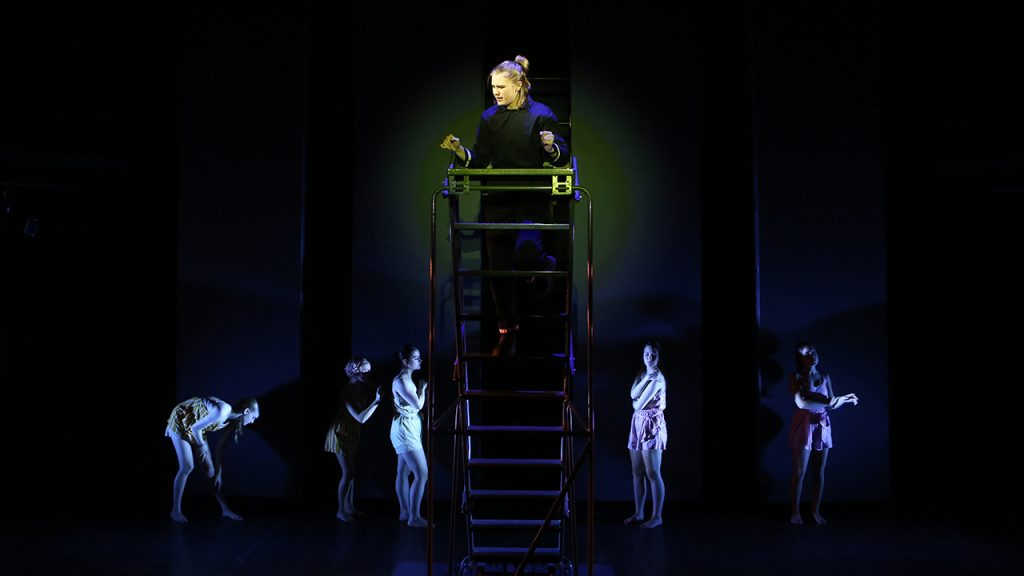
But what does any of it mean? Perhaps Zichichi was dancing with the lamp to signify the character’s loneliness during the high of isolation. Maybe Lucey sat, surrounded by his “things” in the very first scene, to show the capitalistic urge to consume as a means of control. But what about the painting and the dancing and the singing? Perhaps it is a means of controlling what we can during a time surrounded by uncertainty. Certainly, a play, originally about the COVID-19 pandemic, would try to make meaning of the three years of our lives lost to isolation, right?
Or maybe, it doesn’t have any meaning at all.
What I love about [RE]MAKING is that if you try to search for “meaning”, you miss out on what’s happening right in front of you. There is no way to summarize the plot of this play because there is no standard “plot”- the play itself is an act of creation about the act of creating. During the height of the pandemic, we artists had to find a way to continue making our art, and that’s exactly what we did. We persevered. We had to “remake” the way in which we lived our lives. It didn’t matter what it meant- we just had to do it, because surviving alone wasn’t enough. We had to find new ways to live.
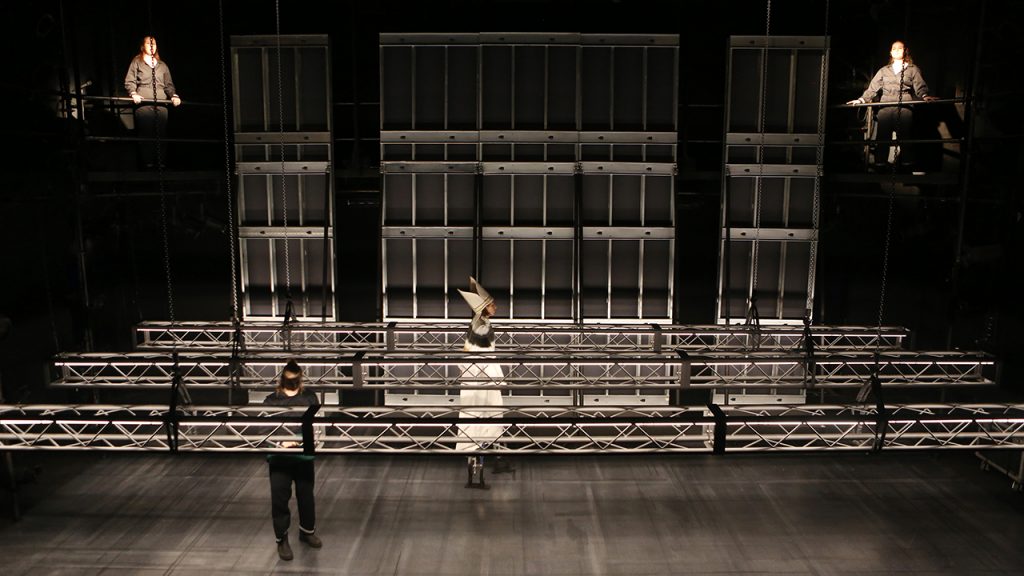
Furthermore, the production of [RE]MAKING itself is an act of performance, making the audience “remake” the ways in which we view live theater. Whereas traditionally, sight lines and spike tape are hidden from the audience, Jared Klein draws attention to them through the use of lighting and projections. The audience becomes aware of where The Bodies will move next, or where a set piece will be placed. During part #12, titled “The Beating (Heart)”, the words “Loud Noise” is projected onto the stage before Lucey, dressed as a clown, completely decimates a trash can with a baseball bat. There are no surprises when it comes to “remaking” theater.
Even the stage manager, Lu Glassberg (‘26), and the assistant stage managers, Ella Theo-Harris (‘26) and Audrey Spiegel (‘27), played dual roles as performers as well. Each of these crew members also wore the same black jumpsuit that The Bodies wore regularly throughout the show, and if you blinked you could have missed it, but whenever large props or set pieces had to be moved during a song, you could see that Ella and Audrey were also singing and moving in tandem with the cast. Nobody could forget the beautifully haunting melody of Glassberg’s aria, their voice drawn from the darkness to the catwalk as they were called in as a surprise performer. I physically gasped and jumped out of my seat when Glassberg was revealed to be the mystery singer all along- I would very much love to see them perform in one of the music department’s opera workshops one day. It goes to show that here at Skidmore, our students take pride in being multifaceted performance artists.
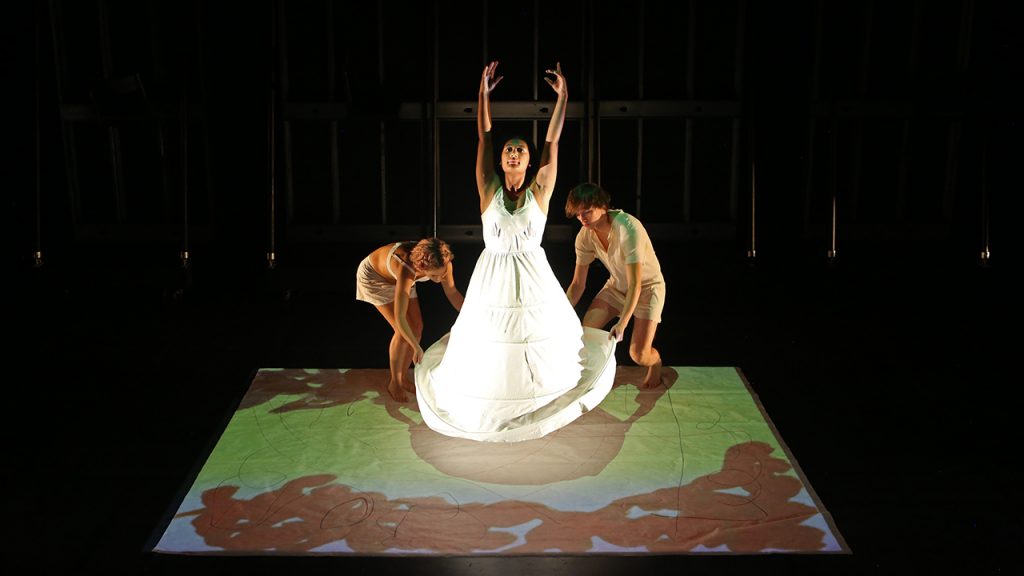
At the climax of the play during the song titled “Time is But a Memory”, The Bodies remove their black jumpsuits to reveal white undergarments, partaking in a ritualistic dance of sorts. It is enchanting, pulling the audience into a trance. The climax of the play is the height of desocialization- once you’ve stripped yourself of a collective identity, what are you left with? Who do you become? From there, The Bodies are left to “remake” who they are, as the play slowly unfurls towards its conclusion.
The idea that “life imitates art” is not a new construction, but perhaps it is more fair to say that what we strive to create as artists is a reflection of the world around us. As Shakespeare said, “All the world’s a stage, and all the men and women merely players”. [RE]MAKING ends in a very similar way to how it begins, but instead of various “hellos” overlapping each other, each cast member enters the stage in their everyday clothes to recite a monologue in the round. The monologue, titled “People Forget…” is a testament to human resilience in the face of adversity- the perfect way to close a play that is, at its core, about the COVID-19 pandemic. The cast wears their everyday clothes, instead of the black jumpsuits, to signify they have been “resocialized”… but what does that mean? It doesn’t mean anything. As a projection of the word “[RE]MAKING” is shone across the stage, the audience is left to wonder where our cast of Bodies will go from here. They will not go anywhere, because the play ends. In true Jared Klein fashion, there is no curtain call, but rather a screen that is rolled onstage to show the end credits. The lights come up. The audience does not receive the luxury of knowing this was “just a performance”, because, in real life, there are no bows at the end. We, as the audience, must take what we have seen into the real world, and move forward. Congratulations to Jared Klein and the cast and crew of [RE]MAKING. Another outstanding Black Box performance for the books, and I cannot wait to see what you all do next!
Photos by Sue Kessler
***
Max McGuire ’24 is a staff writer for the Skidmore Theater Living Newsletter
